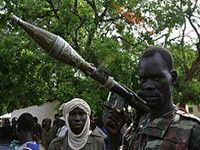Clashes leave 500 dead in Central African Republic
The UN announced recently that more than 500 people have died in Bangui, capital of the Central African Republic, since November 5, when fighting between local militias was resumed. The death toll is expected to increase in the coming days, according to a spokesman for the UN High Commissioner (UNHCR) for human rights, Ravina Shamdasani.

"While security has improved in recent days in Bangui, we continue to be alarmed by the increase in tension between religious communities in the country," said Ravina. According to the UN, at various points of the capital attacks occurred between Christians and Muslims in the last days, in which several people have died.
"Very serious violations of human rights are committed for religious reasons, as well as looting and destruction of private property. A mosque was torched and another was destroyed earlier this week in Bangui," denounced the spokesperson.
The situation is also tense in other cities, such as Bouca, Bossangoa and Bozoum, where there is "a vicious cycle of attacks and reprisals." According to the UN, 27 Muslims were killed last week by militias known as anti-Balaka in the city of Bohong, near Bouar.
Clashes between Seleka militias of the Muslim faith, and anti-Christian Balaka groups, intensified last week, hours before the UN authorized military the intervention of France alongside an African peacekeeping force with a mandate to "protect the civilian population and restore order."
The conflict has caused the displacement of 159,000 people who were forced to leave their homes, according to the latest data from the UN High Commissioner for Refugees (UNHCR), which accounted for three days on this number 108,000.
"In Bangui airport about 38 thousand people live as refugees without access to toilets, running water and without a roof to protect them from rain and sun," the UNHCR spokesman Adrian Edwards said. In addition, approximately 12 thousand people are settled in Saint Joseph Mukassa Church in Bangui.
According to the UNHCR, IDPs urgently need food, shelter, soap and other basic necessities and 460 of these people need urgent medical attention, among which include 101 pregnant women and three newborn babies.
Meanwhile, the UN agency has distributed relief to 3,500 families in Bangui, "a number still relatively small for our needs," Edwards admitted.
The exodus of population caused by the crisis has already reached neighboring countries like the Democratic Republic of Congo, which has received about 1,800 refugees, mainly coming from Bangui and Zongo and hosted in Libenge.
Source: Opera Mundi
Translated from the Portuguese version
Olga Santos
Subscribe to Pravda.Ru Telegram channel, Facebook, RSS!


